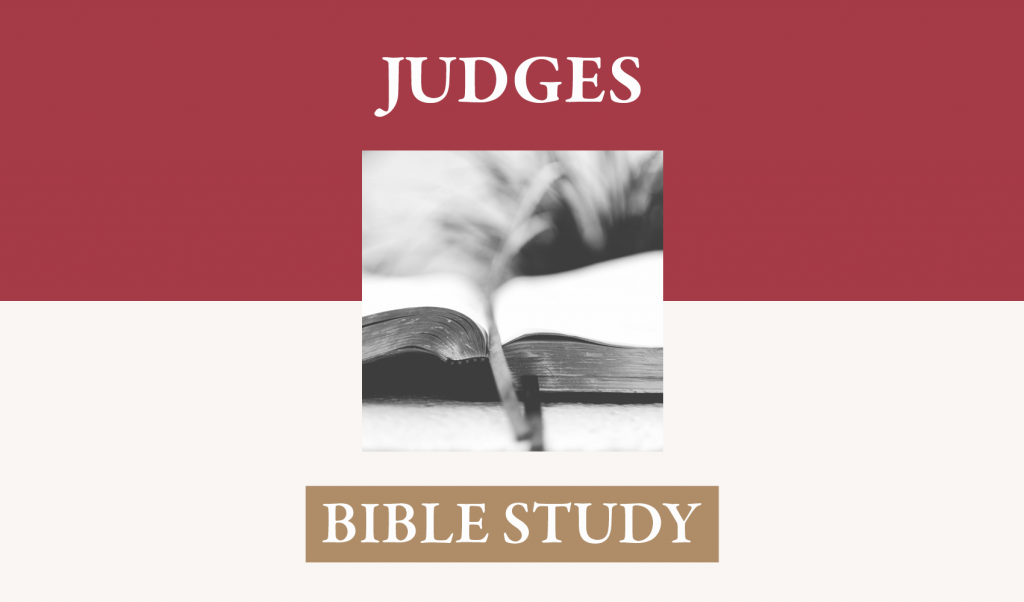INTRODUCTION: The last four chapters of the book of Judges depart from the pattern established in chapter 2. Throughout the book, the author has told the story of Israel’s spiritual compromise, judgment, and deliverance by walking the reader through the notorious pattern of idolatry, domination by foreign powers, and gracious rescue at the hands of an influential leader. Thus the stories of Israel’s “judges” have dominated the book. The judges themselves were never the main point of the story. Characters such as Deborah, Gideon, and Samson have captured the imagination for millennia, but the main two characters were Israel and the Lord. Israel repeatedly turned away from the living God, worshiping idols, ignoring God’s law, and committing treacherous acts in the land. The Lord graciously provided deliverance by raising up leaders to become agents of victory. And then Israel turned away again. The last judge account, the story of Samson, highlighted the disappointing response Israel had given to God’s gracious call upon the nation.
The final five chapters continue the story of Israel’s sinful rebellion through two separate accounts that emphasize the depth of Israel’s decline. The first one, the story of Micah and the Danites, draws attention to Israel’s spiritual decline. The second story is a gruesome tale demonstrating how morally corrupt the nation had become. A common refrain echoes throughout these chapters: “In those days there was no king in Israel. Everyone did what was right in his own eyes,” (17:6, 18:1, 19:1, 21:25). As the Lord revealed to Samuel in 1 Samuel 8:7, the Lord was supposed to be king over them. Just as Israel rejected the Lord in asking for a king like the other nations (1 Samuel 8), so here in the book of Judges God was supposed to be their king. Israel had rejected God as king and they had no earthly king to take leadership and redirect them toward God. The result was moral and spiritual anarchy. The entire book of Judges illustrates the truth of the author’s observation here, but these final two stories serve to punctuate this thesis.
The story of Micah and the Danites focuses on the spiritual corruption evident in Israel. Throughout the book, the author has frankly pointed out that the people had turned to idols. In fact, no attention has been given at all to the worship of God. The only sacrifices offered to the Lord in the text were the ones offered by Gideon, who subsequently built a pagan altar and led Israel astray, and Jephthah, who probably sacrificed his own daughter. Despite God’s clear instructions regarding the important roles the Levites ought to play in the worship of the Lord, no Levite has even been mentioned throughout the entire cycle of sin, rebellion, and deliverance. The Lord’s two instructions to Israel in the Mosaic covenant were “You shall have no other gods before me,” and “Do not make for yourselves an idol.” Israel had clearly made idols, and no evidence has been given that they were serious at all about the worship of the Lord.
But just how bad was the problem? The story of Micah and the Danites answers that question. This story instructs us that worshiping God is of the utmost importance for every human being. And worship cannot be conducted any way we please. God cares about worship, and perverting his worship leads to disastrous consequences. Spiritual decline begins when in our hearts we fail to honor God and fear his commands.
HOMEMADE WORSHIP (17:1-6):
Now that we have completed our survey of the acts of deliverance brought by the Lord during this time of sin and compromise, we take the temperature of Israel’s spiritual devotion. We are immediately introduced to a character that only a “judge” could love: Micah, an Ephraimite who has stolen from his own mother. Not knowing who had stolen her 1,100 pieces of silver the mother had uttered a curse upon the guilty party. Consider the following:
The fact that the mother would utter a curse in response to resolve the problem of the stolen money indicates her spiritual immaturity (at best) or blatant idolatry. A curse was a magical incantation designed to “bind” a god into action against an individual. The Lord does not work that way. Instead, he rewards those who earnestly seek him (Heb 11:6). Her subsequent blessing, using the name of Yahweh, was intended to counteract the curse. She used the name of the Lord for an action that the Lord never commanded and strongly disapproves.
In gratitude for the return of her money, she dedicated the sum of silver to the Lord and made a molten image out of it. Again, Micah’s mother blatantly broke the first two commandments, and did so in the name of the Lord.
Micah furthered the problem by constructing an entire cult around the object. He constructed (or gathered) other idol statutes, made some priestly garments (the ephod), and installed his son as priest. What a bizarre development! A man who stole a pile of money from his own mother returns the money and builds a sizable shrine with her approval! You can’t make this stuff up! The sin of rebellion against the Lord so twists the mind and the heart that the most outrageous of actions seems completely normal. And this family was acting like they were completely normal.
At this point the narrator provides the reader with the first instance of the important refrain, “In those days there was no king in Israel . . . .” No kidding. This is what happens when God is not honored as king. This is what happens when God’s word is not obeyed.
PRIESTHOOD FOR HIRE (17:7-13):
Clearly there were some people in Israel who had no spiritual compass whatsoever. And by the way, what were the Levites doing while all of this “homemade religion” was growing in popularity? As the next paragraph indicates, they were part of the problem. A young Levite (who until the end of the narrative—and for dramatic reasons—remained nameless) wandered into town looking for “a place,” (verse 9). The Levite was not where he should have been. Here is the problem:
God had given the Levite “a place.” He had indicated that the Levites had the Lord himself for an inheritance. They received no permanent territory of their own because theirs was the privilege of leading Israel in the worship of the Lord. For this reason they were scattered by clans throughout the twelve tribes, and the Lord had put this young man’s people in the out of the way (but soon to be important) village of Bethlehem. The young man should not have been looking for “a place.” He had one—following the Lord’s call. He just didn’t like it.
The Levite had no scruples about the right worship of God. Despite the fact that Micah deserved to be stoned to death for fostering idolatry, and the despite the fact that Micah was asking the young Levite to administer his idolatrous cult, the young man responded enthusiastically. Priestly ministry was the family business, and this seemed like good work! He was a priest for hire. God’s instructions to Aaron and Moses faded into oblivion.
Not surprisingly, Micah’s understanding of the Lord is so poor that he viewed the hiring of this Levite to administer his idol cult a sign that the Lord will bless his efforts. God will not bless something that dishonors him. We must follow the Lord as his word instructs. Micah’s homemade religion was off by a long way.
A PERMANENT CULT (18:14-31):
This sordid tale of shameless idolatry reached a new low when a group of Danite spies wandered into town. The tribe of Dan had been given territory by Joshua and was promised that the Lord would help them conquer it, but they had been completely disobedient. Because of this, they felt that “no inheritance among the tribes of Israel had fallen to them.” This, of course, was only a sign of their disobedience and slowness of heart to believe in the Lord (compare Joshua 17:14-18). The spies were tasked with finding a more comfortable place for the people to call home, and this brought them to Micah’s doorstep. Notice the following:
After they noticing the nice collection of idols Micah possessed, the Levite blessed them, saying “your journey is under the eye of the Lord.” This could not have been true, since their quest was a result of their people’s disobedience. And the Levite was administering an idolatrous cult. How could he dare speak on the Lord’s behalf? Especially to speak something so blatantly wrong?
After locating a place (Laish, in the far north of Israel) where the people were clearly living at peace and bothering no one, the Danite spies gathered a group of 600 Danite soldiers and found themselves back at Micah’s doorstep. This time they bullied Micah, stole his gods, and bribed his priest into following them instead. The Levite had no problem with the Danites’ proposal (“the priest’s heart was glad,” verse 20 says). He was an idolatrous priest and a mercenary. And the Danites were no heroes either.
After putting Laish to the sword and building the city of Dan (rather than living in the territory of Dan they had been given by the Lord), they installed the Levite as their priest and used Micah’s idols to build their own shrine, a shrine which was a snare to the people of Israel for hundreds of years (see the book of Kings).
Just to rub salt in the wound, the narrator finally tells us the identity of this Levite. He was Jonathan, son of Gershom, son of Moses. A descendant of Moses himself!
The book of Judges has illustrated for us just how rebellious and disgusting Israel had become. Sure, the tribes of Dan and Ephraim were pursuing idolatry with reckless abandon, but the Levites? Moses’ own descendants? Idolatry had crept into every nook and cranny of Israel’s heart.
SUMMARY:
The narrative of Micah and his idols is designed to provoke outrage, but does it? If it does not, then the condition of our hearts is no better than the condition of Micah, Jonathan, and the Danites. Are we outraged when God is blatantly dishonored by our own family members and by his people? Are we disgusted by sin? More importantly, do we fear the Lord enough to honor him by following his word? None of us have a pedigree that can preserve us from the temptation to turn away from the Lord. And the consequences of doing so are disastrous indeed.






















